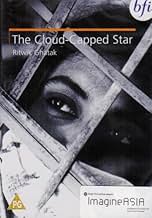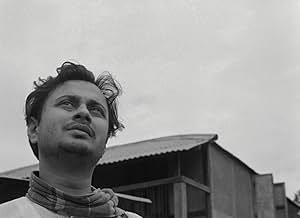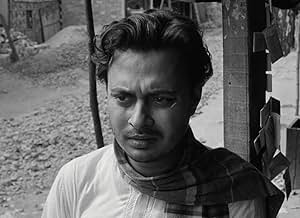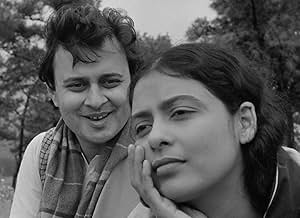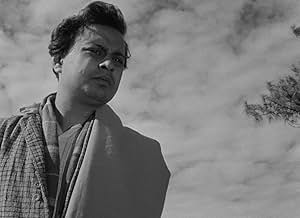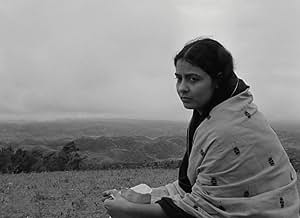NOTE IMDb
7,8/10
3,5 k
MA NOTE
Ajouter une intrigue dans votre langueA selfless young woman (Supriya Choudhury) sacrifices her own happiness for her unappreciative family.A selfless young woman (Supriya Choudhury) sacrifices her own happiness for her unappreciative family.A selfless young woman (Supriya Choudhury) sacrifices her own happiness for her unappreciative family.
- Réalisation
- Scénario
- Casting principal
- Récompenses
- 1 nomination au total
Ranen Ray Choudhury
- Baul singer
- (as Ranen Chowdhury)
Avis à la une
One charge laid against the revered director Satyajit Ray was that, much like Kurosawa in Japan, his films weren't national or native enough, that they gave a Westerner's view of India, one moulded in Western forms, rather than something 'authentically' Indian. Another, related charge, is that he betrayed his subject matter - poverty, nature, repression, obsession etc. - by the fussy perfectionism of his style; David Thomson tells the story of Francois Truffaut, himself survivor of an impoverished, disruptive background, walking out of the aristocratic Ray's 'Pather Panchali', 'wearied by so much perfection'.
I don't know what 'authentically Indian' means; I certainly don't know whether authenticity, so grimly linked to nationalism, is a desirable aim. I suppose an authentically Indian film would not be an exquisite miniature, but a huge, sprawling, unstable, visceral film, full of rupture, sensation, violence, exoticism, noise, incongruity; but these views may be as inauthentically Western as any other. That said, 'The Cloud-Capped Star' seems to me to be a truer film than 'Pather', not necessarily as a representation of Indian experience, but of human experience, and certainly as a cinema experience, of which it is rare and overwhelming.
The irony is that the film is as replete with Western influences as Ray's. Director Ritwik Ghatak was a left-winger, and his film is a thrilling assault on mind and body, using many of the methods developed by Western leftists. The film is unashamedly a melodrama - the harrowing tale of a beautiful, clever, promising young woman who is mentally and physically broken by the relentless fending of a family alternately selfish and feckless.
Like the traditional melodrama , its primary appeal is emotional, as the heroine is battered by an inexorable series of crises, usually signalled by percussive frenzy in the music; characterisation is monochrome, the saintly goodness of the heroine contrasitng with the mean self-interest or cowardice of the rest.
But this is melodrama filtered through those of Douglas Sirk, who took this despised form and gave it a critical dimension. Not only does Ghatak use Sirkian devices - frames within frames, intrusive decor, 'unrealistic' lighting - but he takes the idea of the hysterical body to its limits - just as a character who must repress her emotions betrays them in physical pressures, so the repressions of character and narrative are displaced onto the form of the film, which is full of violent jump cuts, extreme clashes of composition, space and editing, deliberate dis-integration of musical numbers, a radical use of lighting and sound (including bizarre sci-fi whinings), taken to an extreme unavailable to Sirk in Hollywood, giving the film a formal hysteria that is reminiscent of another Sirk admirer, Godard. Did Ghatak see the contemporary 'A Bout De souffle' as he made this film? (I can imagine a tyro cineaste getting the same life-changing excitement from 'Star' as I did from the Frenchman when I was young).
The use of looming close-ups and rushes of blitzkrieg montage recall Eisenstein. The story of a family and a society is reminiscent in its breadth of a Victorian novel, while the schematic, almost scientific analysis of a victim placed in a very carefully observed social context reminds me of Zola. The spiritual power of the heroine's decline is even more staggering than Bresson (although, it's always women, isn't it?).
And yet, for all these formal influences, there is a faith in character missing (deliberately) in these masters, a psychological acuity mirroring the political anger. And if the film is beautiful, it is never complacently so: it is a beauty repeatedly violated, creating a new, modern beauty. Why has this film never made Top Ten lists?
I don't know what 'authentically Indian' means; I certainly don't know whether authenticity, so grimly linked to nationalism, is a desirable aim. I suppose an authentically Indian film would not be an exquisite miniature, but a huge, sprawling, unstable, visceral film, full of rupture, sensation, violence, exoticism, noise, incongruity; but these views may be as inauthentically Western as any other. That said, 'The Cloud-Capped Star' seems to me to be a truer film than 'Pather', not necessarily as a representation of Indian experience, but of human experience, and certainly as a cinema experience, of which it is rare and overwhelming.
The irony is that the film is as replete with Western influences as Ray's. Director Ritwik Ghatak was a left-winger, and his film is a thrilling assault on mind and body, using many of the methods developed by Western leftists. The film is unashamedly a melodrama - the harrowing tale of a beautiful, clever, promising young woman who is mentally and physically broken by the relentless fending of a family alternately selfish and feckless.
Like the traditional melodrama , its primary appeal is emotional, as the heroine is battered by an inexorable series of crises, usually signalled by percussive frenzy in the music; characterisation is monochrome, the saintly goodness of the heroine contrasitng with the mean self-interest or cowardice of the rest.
But this is melodrama filtered through those of Douglas Sirk, who took this despised form and gave it a critical dimension. Not only does Ghatak use Sirkian devices - frames within frames, intrusive decor, 'unrealistic' lighting - but he takes the idea of the hysterical body to its limits - just as a character who must repress her emotions betrays them in physical pressures, so the repressions of character and narrative are displaced onto the form of the film, which is full of violent jump cuts, extreme clashes of composition, space and editing, deliberate dis-integration of musical numbers, a radical use of lighting and sound (including bizarre sci-fi whinings), taken to an extreme unavailable to Sirk in Hollywood, giving the film a formal hysteria that is reminiscent of another Sirk admirer, Godard. Did Ghatak see the contemporary 'A Bout De souffle' as he made this film? (I can imagine a tyro cineaste getting the same life-changing excitement from 'Star' as I did from the Frenchman when I was young).
The use of looming close-ups and rushes of blitzkrieg montage recall Eisenstein. The story of a family and a society is reminiscent in its breadth of a Victorian novel, while the schematic, almost scientific analysis of a victim placed in a very carefully observed social context reminds me of Zola. The spiritual power of the heroine's decline is even more staggering than Bresson (although, it's always women, isn't it?).
And yet, for all these formal influences, there is a faith in character missing (deliberately) in these masters, a psychological acuity mirroring the political anger. And if the film is beautiful, it is never complacently so: it is a beauty repeatedly violated, creating a new, modern beauty. Why has this film never made Top Ten lists?
Gorgeous cinematography, attractive cast, fantastic music. Seriously, I wish I could find the soundtrack for this one. The voices are like musical instruments, full of feeling, and whether we see a performance as a break in the action or hear music and sound effects in the background, it always has an aching, haunting sense to it. Ranen Roychowdhury's eternal river song was a real highlight. All of it works perfectly for the story, which is about a daughter (Supriya Choudhury) who sacrifices her own aspirations in order to support her parents, two brothers, and sister. What held me back from truly loving the film, however, was in just how much suffering this woman endures. My goodness, talk about misery porn.
There are just too many times while in a conversation about her hardships, this young woman slowly turns to the camera with a dreamy look on her face and says something beatific. Meanwhile, her poetry-quoting father has his head in the clouds and is then bed-ridden with an injury, her mother harps on her mercilessly, her older brother shamelessly borrows money from her while devoting all his time to music, her sister has her eye on her boyfriend, and her young brother's focus is on soccer. They are all seriously annoying.
Aside from the qualities of the music that I mentioned, I liked how it helped me understand in a subtle way why this young woman would continue to support her brother (Anil Chatterjee) for the ideal of his art. It's beautiful, and we can perceive that. Unfortunately, much of her other motivation felt like too much for a person to take - even a gentle soul like this one.
When her sister (Gita Ghatak) and her boyfriend (Niranjan Ray), who she's both supported, begin seeing one another without feeling conflicted at all, and then she reacts without saying a word - and even allows her sister to take her bangles - it was the straw that broke the camel's back for me. And that, of course, was not nearly the end of the suffering she has to endure.
The problem with the story is that while there is plenty of escalation - her woes and martyrdom continue to mount throughout the film - there is just not enough transformation. Deep into the film she mentions "I never protested the wrongs done to me. That's my sin," recognizing that she should have stood up for herself, but it's mild and in a victim blaming herself kind of way. There is never a true moment of realization that her own family is cruelly taking advantage of her, or a hint of bitterness. You could say that at the end, she's realized something while knowing that she is tragically too late, but by that point, over two hours in, it was too little, too late for this viewer.
The melodrama is moving and emotional, but I think would have been more powerful had the main character not been the "idealized Bengali woman," dutiful to the point of annihilation. I also wish it had been a little more explicit in its commentary about the Partition of Bengal, which I understand was one of director Ritwik Ghatak's main concerns, though I confess that my own ignorance might have caused me to miss unspoken references and cues. Overall though, it's worth seeing for its visual and aural beauty.
There are just too many times while in a conversation about her hardships, this young woman slowly turns to the camera with a dreamy look on her face and says something beatific. Meanwhile, her poetry-quoting father has his head in the clouds and is then bed-ridden with an injury, her mother harps on her mercilessly, her older brother shamelessly borrows money from her while devoting all his time to music, her sister has her eye on her boyfriend, and her young brother's focus is on soccer. They are all seriously annoying.
Aside from the qualities of the music that I mentioned, I liked how it helped me understand in a subtle way why this young woman would continue to support her brother (Anil Chatterjee) for the ideal of his art. It's beautiful, and we can perceive that. Unfortunately, much of her other motivation felt like too much for a person to take - even a gentle soul like this one.
When her sister (Gita Ghatak) and her boyfriend (Niranjan Ray), who she's both supported, begin seeing one another without feeling conflicted at all, and then she reacts without saying a word - and even allows her sister to take her bangles - it was the straw that broke the camel's back for me. And that, of course, was not nearly the end of the suffering she has to endure.
The problem with the story is that while there is plenty of escalation - her woes and martyrdom continue to mount throughout the film - there is just not enough transformation. Deep into the film she mentions "I never protested the wrongs done to me. That's my sin," recognizing that she should have stood up for herself, but it's mild and in a victim blaming herself kind of way. There is never a true moment of realization that her own family is cruelly taking advantage of her, or a hint of bitterness. You could say that at the end, she's realized something while knowing that she is tragically too late, but by that point, over two hours in, it was too little, too late for this viewer.
The melodrama is moving and emotional, but I think would have been more powerful had the main character not been the "idealized Bengali woman," dutiful to the point of annihilation. I also wish it had been a little more explicit in its commentary about the Partition of Bengal, which I understand was one of director Ritwik Ghatak's main concerns, though I confess that my own ignorance might have caused me to miss unspoken references and cues. Overall though, it's worth seeing for its visual and aural beauty.
it's just that he made films for the love of it and never for anyone else that this somewhat forgotten legend later realised to be great made such a deep film.This film is not about cinematography unlike ray's but this is about the script.The scene where the father say's "you bore the burden and now you are the burden,you shall go' is a landmark in itself.Especially the believe in her somewhat useless brother who becomes a gr8singer in bollywood .This film has to be seen without any distractions.i give film -10 ,script -11, and cinematography -9 all out of 10.The background music is amazing ,it;s tearful.After ,watching i am almost compelled to take up a camera and shoot a film for myself.I don't care about this plastic world anymore.
If I have to chose one movie in my life then it would be this. Ultimate cinematic experience would be an under statement as it is more than that. I can think of Ritwik as the Indian answer to Stanley Kubrick. Meghey Dhaka Tara is like Clockwork Orange made by an equally eccentric and obscure genius, whose impact is appreciated much after his death. The contrast is, unlike Kubrick, very few people know about him as the rating shows here where as, it should have been in the cannon of every cinephile around the world. It is the responsibility of those few of us who have watched it, to spread it. I would like to spend some time here discussing what is so special about the movie.
First of all it is a movie that celebrates beauty. The beauty of nature as captured by some of the breath taking shots of trees that I have ever seen in a movie, the beauty in the affection between the brother and sister eating together side by side, or the face of Neeta gleaming under the sun when Sanat arrives or the beauty captured in Neeta's sister in front of the mirror. It also portrays the beauty in people's mind through many side characters like the compassion of the strict shop keeper. Yet, this beauty both in natural and in human spirit is in sharp contrast with the abject poverty and the bleak refugee colony. Nature plays an intricate role in many of his cinemas like Ajantrik and it often highlights the character and gives it also a context, done in the most effective and subtle way.
The second quality of this movie is the usage of classical music so deliberately for mood change. It reminds me of Kubrick. But here it is done in an much more open fashion. It creates a sense of happiness (read beauty) and often there is a sudden inflection or a discontinuity as if to remind the audience the harsh reality. (there is also a piece of great folk song as well).
The third quality of the movie is it's simplicity and honesty to the subject. Here the movie almost attained the quality of a real documentary. The effect of partition on the Bengali people have never been captured so authentically as been done here, the characters so identifiable, the story so representative and the settings so familiar.
The fourth and true to the identity of the genre it belongs to, this movie is a cinematographic excellence. If Kubrick is fascinated with back-motion and checkered pattern, then Ritwik has his play with frames and off center photography. Here each frame tells more than one story and a face is never complete with the surroundings and is part of it, not the center of it. Also there are other aspects of it like there are meaning to be understood by relating the context and what been showed, something Satyajit is very good at, Ritwik great at and been taken to extreme by Mrinal Sen.
The fifth and most touching part of it is the storyline. It is at the end of the day a very human movie. It talks about individual family and individuals in normal relationship in normal acts of life and in normal background. In that way it touches your heart seeing the struggle and the suffering. It does so without being too apparent or getting too sentimental.
The greatness of this movie lies in achieving all the above qualities in one work of art. It appeals to all the senses and linger long in your mind. One viewing is not enough to comprehend it fully like all great movies as there are many things in it that get revealed only after repeated viewing
First of all it is a movie that celebrates beauty. The beauty of nature as captured by some of the breath taking shots of trees that I have ever seen in a movie, the beauty in the affection between the brother and sister eating together side by side, or the face of Neeta gleaming under the sun when Sanat arrives or the beauty captured in Neeta's sister in front of the mirror. It also portrays the beauty in people's mind through many side characters like the compassion of the strict shop keeper. Yet, this beauty both in natural and in human spirit is in sharp contrast with the abject poverty and the bleak refugee colony. Nature plays an intricate role in many of his cinemas like Ajantrik and it often highlights the character and gives it also a context, done in the most effective and subtle way.
The second quality of this movie is the usage of classical music so deliberately for mood change. It reminds me of Kubrick. But here it is done in an much more open fashion. It creates a sense of happiness (read beauty) and often there is a sudden inflection or a discontinuity as if to remind the audience the harsh reality. (there is also a piece of great folk song as well).
The third quality of the movie is it's simplicity and honesty to the subject. Here the movie almost attained the quality of a real documentary. The effect of partition on the Bengali people have never been captured so authentically as been done here, the characters so identifiable, the story so representative and the settings so familiar.
The fourth and true to the identity of the genre it belongs to, this movie is a cinematographic excellence. If Kubrick is fascinated with back-motion and checkered pattern, then Ritwik has his play with frames and off center photography. Here each frame tells more than one story and a face is never complete with the surroundings and is part of it, not the center of it. Also there are other aspects of it like there are meaning to be understood by relating the context and what been showed, something Satyajit is very good at, Ritwik great at and been taken to extreme by Mrinal Sen.
The fifth and most touching part of it is the storyline. It is at the end of the day a very human movie. It talks about individual family and individuals in normal relationship in normal acts of life and in normal background. In that way it touches your heart seeing the struggle and the suffering. It does so without being too apparent or getting too sentimental.
The greatness of this movie lies in achieving all the above qualities in one work of art. It appeals to all the senses and linger long in your mind. One viewing is not enough to comprehend it fully like all great movies as there are many things in it that get revealed only after repeated viewing
If Satyajit Ray is the virtuoso of Indian cinema, Ghatak is the maverick. His films aren't as polished or subtle as Ray's, but he takes bold chances. Most blatantly in the sound design, with startling (and often beautiful) use of music, ambient noise, reverb, and effects that are almost sci-fi. Perhaps only Lynch is as distinctive in the employment of audio techniques. Not all of Ghatak's gambles pay off. Take, for instance, his insistence on casting the goofy Bijon Bhattacharya in most of his films. Bhattacharya's performance here isn't quite as damaging as his turn in THE GOLDEN THREAD, but it's easily the weakest aspect of the film. However, the primary focus is on Nita (Supriya Choudhury), the girl whose family walks all over her, and resent her for it in the process. As her brother chides her: "You'll suffer. Those who suffer, suffer forever." The family is a microcosm of Ghatak's obsession, the damage caused by the Partition, commenting on those who exploit the weak, and those who let themselves be exploited. It's high melodrama, but like Sirk, is done so artfully and effectively that it's a wonder to behold, with breathtaking images, unforgettable moments, and that idiosyncratic audio field.
Le saviez-vous
- AnecdotesEtoile cachée (1960) is part of the Criterion Collection, spine #993.
- GaffesWhen Nita meets her former lover at the tree near the pond (after about 90 minutes), a microphone is visible in the top left corner.
- Citations
Baul singer: [singing] I wasted all my good days, Now, in bad times, I've come to the river's edge, Boatman, I don't know your name, Who shall I call out to? Who shall I call out to? Oh, my heart, who will take you across? There is a boat but no boatman, There is no one on the river bank, There is no one on the river bank...
- ConnexionsFeatured in The Story of Film: An Odyssey: New Directors, New Form (2011)
Meilleurs choix
Connectez-vous pour évaluer et suivre la liste de favoris afin de recevoir des recommandations personnalisées
- How long is The Cloud-Capped Star?Alimenté par Alexa
Détails
- Date de sortie
- Pays d’origine
- Site officiel
- Langues
- Aussi connu sous le nom de
- The Cloud-Capped Star
- Société de production
- Voir plus de crédits d'entreprise sur IMDbPro
- Durée2 heures 6 minutes
- Couleur
- Mixage
- Rapport de forme
- 1.33 : 1
Contribuer à cette page
Suggérer une modification ou ajouter du contenu manquant



